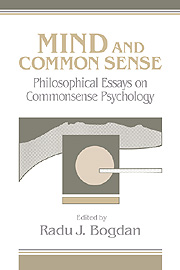Book contents
- Frontmatter
- Contents
- List of Contributors
- 1 The Folklore of the Mind
- 2 Analysis without Noise
- 3 Folk Psychology and the Explanation of Human Behavior
- 4 Methodological Reflections on Belief
- 5 Consciousness and Content
- 6 The Inevitability of Folk Psychology
- 7 How is Eliminative Materialism Possible?
- 8 The Long Past and the Short History
- 9 Common Sense Naturalized: The Practical Stance
- Index
1 - The Folklore of the Mind
Published online by Cambridge University Press: 24 September 2009
- Frontmatter
- Contents
- List of Contributors
- 1 The Folklore of the Mind
- 2 Analysis without Noise
- 3 Folk Psychology and the Explanation of Human Behavior
- 4 Methodological Reflections on Belief
- 5 Consciousness and Content
- 6 The Inevitability of Folk Psychology
- 7 How is Eliminative Materialism Possible?
- 8 The Long Past and the Short History
- 9 Common Sense Naturalized: The Practical Stance
- Index
Summary
A distinguished wise man, Emil Cioran, with whom I share a country of birth and the thought that follows, said once that the two most interesting things in life are gossip and metaphysics. I can hardly think of a more self-evident and enjoyable truth, if wisely construed. This volume combines the two pleasures, for it is an exercise in the metaphysics of wise gossip, of how we make sense of each other, and how, as a result, we interpret, explain, rationalize, and evaluate our representations and actions. The body of wisdom that allows us to do all this is currently called folk or commonsense psychology. I will also call it psychofolklore or the folklore of the mind.
The folklore of the mind has probably been around for as long as minds have. People were so used to it that they rarely asked serious questions about its nature and modus operandi. Little appeared to be at stake. Not anymore; there is now a surprising surge of interest in our psychofolklore. The stakes are high. It is not that we want to understand the mind. We always wanted that. It is rather that now, unlike in the past, our psychofolklore has a role to play in our understanding of the mind. Why such a role, and what could it be? It is true that common sense provides the home language in which we conceptualize the mind.
- Type
- Chapter
- Information
- Mind and Common SensePhilosophical Essays on Common Sense Psychology, pp. 1 - 14Publisher: Cambridge University PressPrint publication year: 1991

